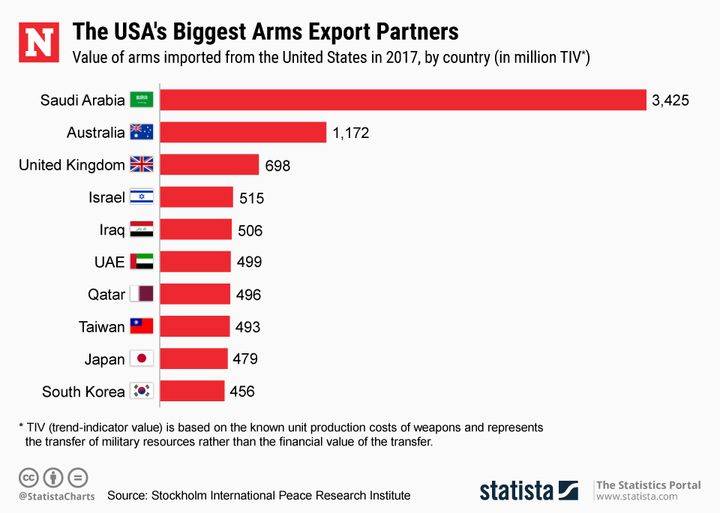伊朗批评美国及其伙伴向其中东盟友出售大量武器,警告这种武器销售正在破坏该地区的稳定。
伊朗外交部长穆罕默德贾瓦德扎里夫周一称,美国去年“向该地区出售了500亿美元的武器”,并指出“该地区人口不到三分之一的一些国家仅在军事采购上花费了870亿美元。”他强调了这种差异,并指出他自己的国家“去年在所有军队上花费了160亿美元,军队中有将近100万人。”
扎里夫在接受半岛电视台采访时谈到美国的两个亲密盟友时说:“拥有100万土著人口的阿拉伯联合酋长国花费了220亿美元,沙特阿拉伯花费了870亿美元。”。
“现在,如果你谈论的是来自该地区国家的威胁,威胁来自美国及其西方盟友,他们正在该地区倾倒武器,使其成为一个随时准备爆炸的火药桶,”他补充道。

据报道,法新社6月13日从半官方的伊朗学生通讯社获得的一张照片显示,挪威拥有的“阿尔泰前线”油轮在阿曼湾水域遭到袭击,该油轮距离霍尔木兹海峡不到100英里。美国和伊朗指责对方造成波斯湾地区的动荡。伊朗学生新闻社/法新社/盖蒂图片社
扎里夫是在卡塔尔访问期间发表上述言论的,他在多哈会见了当地的谢赫·穆罕默德·本·阿卜杜勒拉赫曼·阿勒萨尼和埃米尔·谢赫·塔米姆·本·哈马德·阿勒萨尼。此次访问是伊朗加强与逊尼派穆斯林占多数的阿拉伯半岛紧张关系的最新努力,许多人加入了美国孤立革命什叶派伊斯兰共和国的呼吁。
卡塔尔是美国的主要盟友,也是美国在中东最大军事基地的所在地,但这个小小的半岛国家也是沙特阿拉伯领导的地区封锁的目标,巴林、埃及和阿联酋也实施了封锁。除了指责多哈支持恐怖主义,该国与德黑兰的持续联系也是抵制的原因之一。
然而,随着美国和伊朗在波斯湾的紧张局势恶化,甚至阿联酋的安全官员也会见了伊朗边境警察签署协议关于本月早些时候的联合海上合作。扎里夫和其他伊朗官员也与科威特、阿曼和伊拉克进行了会谈,这些国家与伊朗和美国都保持着密切的关系
目标是促使该地区反对美国在整个波斯湾扩大外国军事存在的计划。华盛顿和五角大楼指责德黑兰扰乱霍尔木兹海峡的交通,霍尔木兹海峡是世界上最重要的石油阻塞点,但伊朗官员辩称,是美国导致了那里更大的不安全。
扎里夫周一在推特上发布了他在卡塔尔会谈的照片。
 图表显示了2017年美国武器的最大接受者。世界第二大武器进口国沙特阿拉伯声称超过了接下来五个主要国家的总和。STATISTA
图表显示了2017年美国武器的最大接受者。世界第二大武器进口国沙特阿拉伯声称超过了接下来五个主要国家的总和。STATISTA
到目前为止,英国是唯一一个正式响应美国在波斯湾领导联盟的国家。法国批评了这一想法,德国断然拒绝,而中国和俄罗斯支持伊朗的地区对话计划。所有七个国家都是2015年核协议的签署国,该协议旨在为德黑兰提供制裁减免,以换取遏制其核计划,但华盛顿去年退出了该协议。
该协议的其他缔约方继续支持该协议,但欧洲一直在面临美国制裁的威胁下努力实现贸易正常化。与此同时,各方都呼吁双方缓和局势。
伊朗官员谴责美国军方决定加强其自身及其在波斯湾盟友的存在。上周,以色列暗示,它可能在美国领导的反伊朗联盟中发挥作用,伊朗国防部长阿米尔·哈塔米最近警告说,这一举动将会发生”灾难性后果。"
伊朗革命卫队海军司令阿里·雷萨·唐西里少将周日告诉黎巴嫩新闻媒体阿尔·马亚德恩,他的部队“负责确保霍尔木兹海峡和波斯湾的安全,不需要陌生人。”
IRAN WARNS U.S. AND ALLIES' ARMS SALES COULD 'BLOW UP' MIDDLE EAST
Iran has criticized the massive amount of weapons sold by the United States and its partners to their Middle Eastern allies, warning such arms sales were destabilizing the region.
Iranian Foreign Minister Mohammad Javad Zarif argued on Monday that the U.S. "sold $50 billion of weapons to this region" last year, pointing out that "some of the countries in the region with less than a third of our population spend $87 billion on just military procurement." Highlighting the disparity, he noted that his own country "spent last year $16 billion on all its military with almost one million people in the army."
"The United Arab Emirates with a total one-million indigenous population spent $22 billion, Saudi Arabia spent $87 billion," Zarif said of the two close U.S. allies in an interview with Al Jazeera.
"Now, if you are talking about threats coming countries in the region, the threats are coming from the U.S. and its Western allies who are pouring weapons in the region, making it a tinderbox ready to blow up," he added.
 A picture obtained by AFP from the semi-official Iranian Students' News Agency on June 13 reportedly shows fire and smoke billowing from Norwegian-owned Front Altair tanker said to have been attacked in the waters of the Gulf of Oman, less than 100 miles from the Strait of Hormuz. The U.S. and Iran have blamed one another for causing unrest across the Persian Gulf region.IRANIAN STUDENTS' NEWS AGENCY/AFP/GETTY IMAGES
A picture obtained by AFP from the semi-official Iranian Students' News Agency on June 13 reportedly shows fire and smoke billowing from Norwegian-owned Front Altair tanker said to have been attacked in the waters of the Gulf of Oman, less than 100 miles from the Strait of Hormuz. The U.S. and Iran have blamed one another for causing unrest across the Persian Gulf region.IRANIAN STUDENTS' NEWS AGENCY/AFP/GETTY IMAGES
Zarif made the remarks during a trip to Qatar, where he met his local counterpart Sheikh Mohammed bin Abdulrahman al-Thani and Emir Sheikh Tamim bin Hamad Al Thani in Doha. The visit was Iran's latest effort to boost strained ties with the mostly Sunni Muslim Arabian Peninsula, where many have joined the U.S.' call to isolate the revolutionary Shiite Islamic Republic.
While Qatar is a major U.S. ally and home to the biggest U.S. military base in the Middle East, the tiny peninsular nation was also targeted by a regional blockade led by Saudi Arabia and also enforced by Bahrain, Egypt and the UAE. In addition to accusing Doha of supporting terrorism, the country's ongoing links to Tehran were among the reasons cited for the boycott.
As U.S.-Iran tensions worsen in the Persian Gulf, however, even security officials from the UAE met with Iranian border police to sign a pact on joint maritime cooperation earlier this month. Zarif and other Iranian officials have also been in talks with Kuwait, Oman and Iraq, which maintains close ties to both Iran and the U.S.
The goal has been to foster regional opposition toward U.S. plans to expand foreign military presence throughout the Persian Gulf. Washington and the Pentagon have accused Tehran of disrupting traffic in the Strait of Hormuz, world's most important oil chokepoint, but Iranian officials have argued that it was the U.S. who has led to greater insecurity there.
"#NeighborsFirst," Zarif tweeted Monday alongside photos of his talks in Qatar.
 A chart shows the top recipients of U.S. arms in 2017. Saudi Arabia, the world's second-largest weapons importer, claimed more than the next five leading countries combined.STATISTA
A chart shows the top recipients of U.S. arms in 2017. Saudi Arabia, the world's second-largest weapons importer, claimed more than the next five leading countries combined.STATISTA
So far, the United Kingdom is the only country to officially heed calls for a U.S.-led coalition in the Persian Gulf. France has criticized the idea and Germany has outright rejected it, while China and Russia have backed Iran's plan for a regional dialogue. All seven countries were signatories of a 2015 nuclear deal designed to provide Tehran sanctions relief in exchange for curbing its nuclear program, but Washington withdrew last year.
Other parties to the agreement have continued to support it, but Europe has struggled to normalize trade under threat of facing U.S. sanctions. At the same time, all have appealed to both parties for de-escalation
Iranian officials have condemned the U.S. military's decision to bolsters its own presence and that of its allies in the Persian Gulf. Last week, Israel suggested it may play a role in a U.S.-led coalition against Iran, a move that Iranian Defense Minister Amir Hatami recently warned would have "disastrous consequences."
Iranian Revolutionary Guards navy commander Rear Admiral Ali Reza Tangsiri told Lebanese news outlet Al Mayadeen on Sunday that his forces "are responsible for ensuring the security of the Strait of Hormuz and the Persian Gulf and there is no need for strangers."





